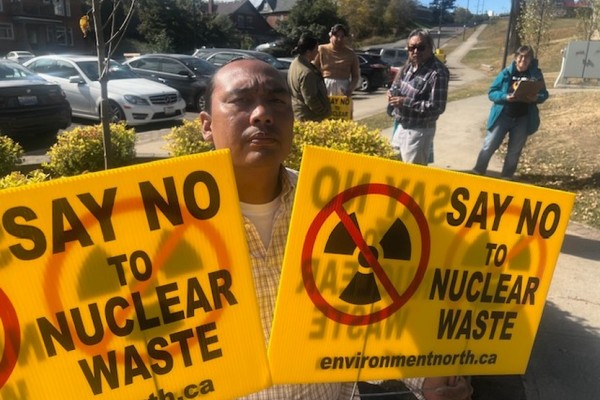-

Nuclear industry selects site in northwestern Ontario for waste disposal amidst regional opposition
On November 28, the Nuclear Waste Management Organization (NWMO) announced it had selected Wabigoon Lake Ojibway Nation and the municipality of Ignace as “host communities” for all of Canada’s high-level nuclear waste. Yet the extent to which the people of northwestern Ontario consent to the proposed waste repository is, at best, unclear.
-

Return of the ‘F’ word: Fascism and remembrance
History is teaching us that a return to liberal democratic normality marinated in neoliberalism has passed its best-before date. To honour the sacrifices of the World War II generation, and the innocent victims of war, including the mothers of the Atacama, we need to educate ourselves about fascism—what it is, and how to defeat it.
-

The Hub trades increasingly in sponsored content
It’s one thing for outlets like The Hub to sell editorial space to corporations or even paid propagandists, but involving real journalists in the process puts them in an unenviable situation. As Marc Edge writes, it makes you wonder how a journalism purist like Peter Menzies might feel about writing sponsored content.
-

From Kanehsatà:ke to Palestine
Ellen Gabriel was the spokesperson for the Kanien’kehà:ka defending “The Pines” from a proposed nine-hole golf course expansion in 1990. Nearly 35 years later, When the Pine Needles Fall offers a counter-history that retells the story of the conflict and situates the crisis as the latest entry in a centuries-long history of violent occupation and land theft that began in 1717.
-

Safer supply is under attack when we need it most
Safer supply is a public health initiative meant to keep people alive and connected to care. It is a lifeline. A tether to the supports necessary to move towards wellness. If our goal is to end the opioid epidemic, safer supply, harm reduction services, and voluntary treatment must be supplements to a larger project of reconstruction.
-

Why seek closer economic ties with a US dictatorship?
The pandemic taught us the risk of relying on global supply chains. They are fragile and can be upset by political upheavals. Trump’s election upsets the apple cart. It’s time to recalibrate Canada’s place in the world. If we’ve lost one reliable friend, can we gain others? Will we take charge of our own economy so we can maintain democracy here?
-

Ta-Nehisi Coates, Palestine, and a message of resistance
In The Message, Coates writes of a constellation of shared experiences—between Black Americans, Africans, Palestinians—which led him to feel “the warmth of solidarity, of conquered peoples… finding each other across the chasm of oceans and experience.” It is the recognition that if the imperial powers operate conjointly to oppress us, we ought to join in solidarity ourselves.
-

Canada’s news media must be refashioned for the future
Writing about all of the problems with the ownership of Canada’s news media, as I have done for the past quarter century, has become frustrating. From sky-high concentration of corporate ownership to our hare-brained millennium experiment with the “convergence” of newspaper and television ownership to massive foreign ownership by faceless hedge funds, the problems only keep getting worse.
-

What is the West’s end-goal in Ukraine?
Russia has now fired an experimental hypersonic medium-range ballistic missile at a Ukrainian industrial facility in the city of Dnipro. This raises questions about the West’s policy of incremental escalation in Ukraine, specifically what goals it is meant to achieve, whether those goals are actually achievable, and whether the cost of pursuing those goals may be so high as to render them unwise.
-

Assassination plot in Bolsonaro’s office raises question—why did Canada support him?
The alleged assassination plot by members of Jair Bolsonaro’s inner circle is the latest indication of the Brazilian right’s intense hatred for their political enemies. For years, their attacks on the left have been supported by Washington and Ottawa, whose companies benefit from the policies implemented by these reactionary governments.



